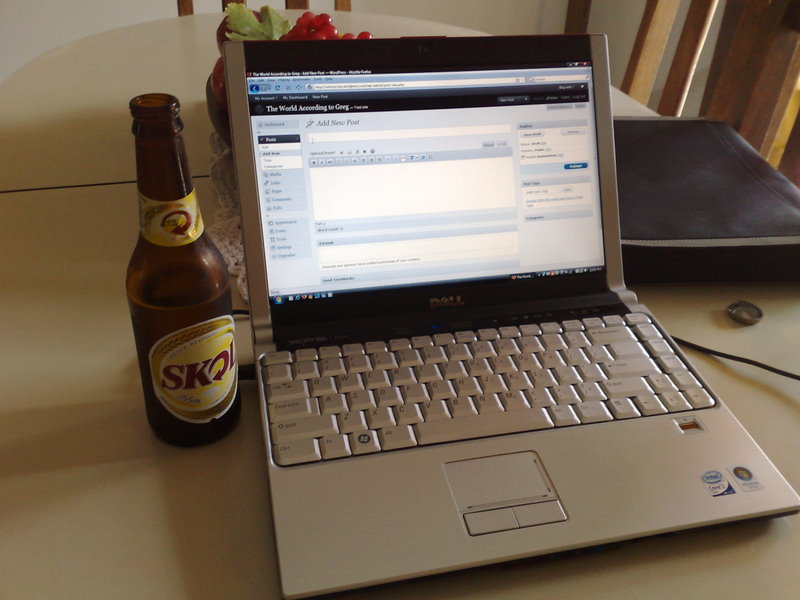
Greetings, folks that are measuring temperatures in the single digits (celsius). Okay, enough gloating. Here’s a quick weather report – it’s warm and a bit humid. There’s a chance of a thunderstorm later. The weather will probably be the same every day here for the next few months – it’s summer time here. I just returned from a walk into Retiro, where I dropped off my Brasileira at the beauty shop and used my debit card at HSBC for travel money.
Last spring, I lost some money at this HSBC branch due to a scam. The less-than-honest-but-very-helpful folks somehow got the machine to eat my card and then watched me try to use it, getting my PIN in the process. Somehow, they were able to retrieve my card later and use it (and my discovered PIN) to withdraw reais. It was nice to see that the ATM machines have all been changed to the type that swipe your card without you having to lose sight of it. I have seen these machines becoming more popular in the US as well. I like not having to trust my card to a machine.
.
We Love our Cars in Brasil, too.
I am in a pretty prosperous part of the country. The city of Volta Redonda is host to a huge steel plant built here during WW2 by Americans in exchange for a much-needed air base in the eastern part of the country. We’re no longer at war with Hitler in Africa, but the steel plant remains. CSN is an asset to the community, pumping money into the economy and supplying good jobs to local folks. Because of this, my Brasil experiences may not be typical.
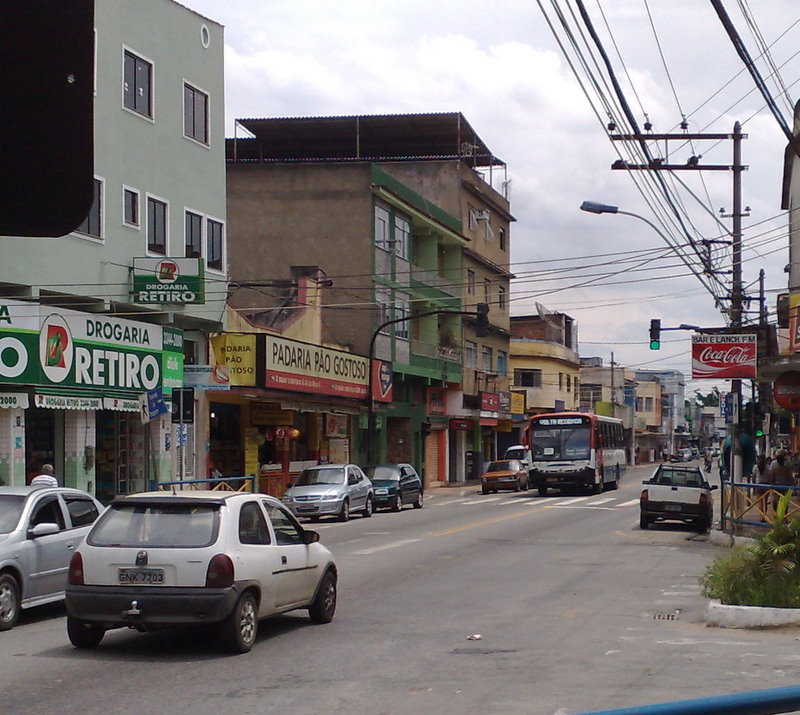 Here in Volta Redonda, we have an excellent bus system. If you miss the onibus, there will be another along in a few minutes. We also have a very good intra-city bus system. There is regularly scheduled service between most cities. There’s a bus from Rio to Volta Redonda every hour or so. The cost is about R$25 each way and it takes about two hours. Very convenient. Unlike where I live in the US, you could likely do without a car – it’s a luxury here.
Here in Volta Redonda, we have an excellent bus system. If you miss the onibus, there will be another along in a few minutes. We also have a very good intra-city bus system. There is regularly scheduled service between most cities. There’s a bus from Rio to Volta Redonda every hour or so. The cost is about R$25 each way and it takes about two hours. Very convenient. Unlike where I live in the US, you could likely do without a car – it’s a luxury here.
The government takes advantage of the automobile’s luxury status by taxing the bejeebers out of them. A new Fiat Palio (a common automobile in Brasil) costs about R$30,000. It’s about what a Ford Focus costs in the US. Here, you get a one liter motor, crank up windows, and if you want air bags, you’re going to pay extra for them. Automatic transmissions are 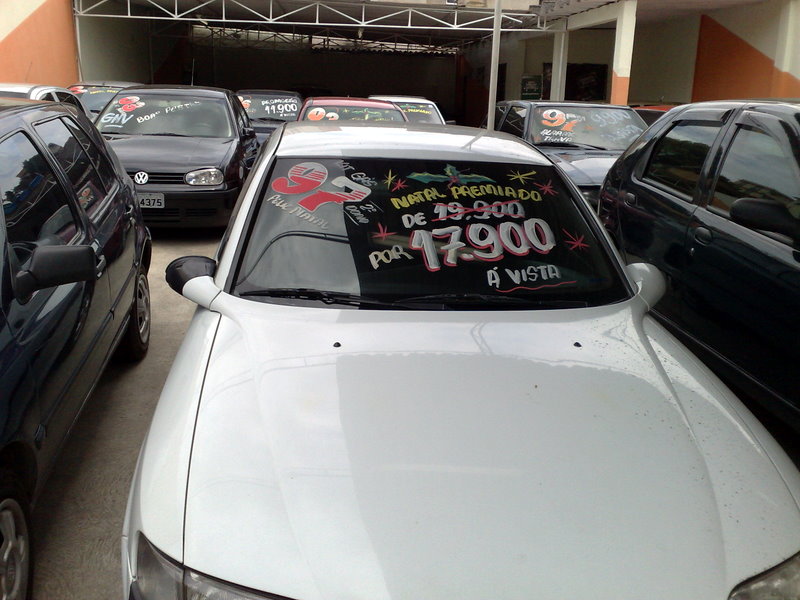 generally unavailable on domestic cars. Imports are taxed at a rate of about 100%, and you can expect delays and additional fees. Importing used cars is not allowed – they’re serious about protecting their market. Of course, keeping competion out by limiting imports has a price, too. The cars here are very basic. In the US, our cars are expensive because the government mandates all sorts of equipment. In Brasil, they’re expensive because the government just takes a big, fat cut. If you can afford to buy a car, you can afford the taxes. Because of this, used cars are expensive, too. Most folks take very good care of their cars and expect to make money on them when they sell them. You don’t see $1000 cars here. As an example, here’s a photo that I took this afternoon while walking home from the ATM. That’s a 1997 Celta four door. It’s eleven years old, and they’re asking R$17,900 for it. I’m willing to bet that it wasn’t much more than that when it was new. It doesn’t have air, and you have to change gears yourself. It’s pretty well-preserved, though. Body work is inexpensive and one seldom sees cars with wrinkled fenders driving around. I saw a Chevette (remember them?) this afternoon in Retiro. It didn’t have a scratch, but I’ll bet there was a ton of Bondo on it…. There are lots of shops that can repair your upholstery reasonably or recharge your A/C (if you’re lucky enough to have it). There are two or three auto sound places near here that will install the latest auto sound (or car alarm) system if you need one. Labor costs are reasonable, but parts cost about twice what they do in the states – much more if you have an imported car. Our Tipo was an imported car. I needed a ballast resistor for the heater fan – the parts store wanted over R$250 for the part (a $20 part in the US). I paid a shop R$50 to repair it (I’m guessing that it wasn’t a FIAT part….)
generally unavailable on domestic cars. Imports are taxed at a rate of about 100%, and you can expect delays and additional fees. Importing used cars is not allowed – they’re serious about protecting their market. Of course, keeping competion out by limiting imports has a price, too. The cars here are very basic. In the US, our cars are expensive because the government mandates all sorts of equipment. In Brasil, they’re expensive because the government just takes a big, fat cut. If you can afford to buy a car, you can afford the taxes. Because of this, used cars are expensive, too. Most folks take very good care of their cars and expect to make money on them when they sell them. You don’t see $1000 cars here. As an example, here’s a photo that I took this afternoon while walking home from the ATM. That’s a 1997 Celta four door. It’s eleven years old, and they’re asking R$17,900 for it. I’m willing to bet that it wasn’t much more than that when it was new. It doesn’t have air, and you have to change gears yourself. It’s pretty well-preserved, though. Body work is inexpensive and one seldom sees cars with wrinkled fenders driving around. I saw a Chevette (remember them?) this afternoon in Retiro. It didn’t have a scratch, but I’ll bet there was a ton of Bondo on it…. There are lots of shops that can repair your upholstery reasonably or recharge your A/C (if you’re lucky enough to have it). There are two or three auto sound places near here that will install the latest auto sound (or car alarm) system if you need one. Labor costs are reasonable, but parts cost about twice what they do in the states – much more if you have an imported car. Our Tipo was an imported car. I needed a ballast resistor for the heater fan – the parts store wanted over R$250 for the part (a $20 part in the US). I paid a shop R$50 to repair it (I’m guessing that it wasn’t a FIAT part….)
Gasoline here is about R$2.50 per liter. This price hasn’t changed since 2006, when I started coming to Brasil. It’s nice that the government insulates the public from the wide price swings the we have seen in the US. Howe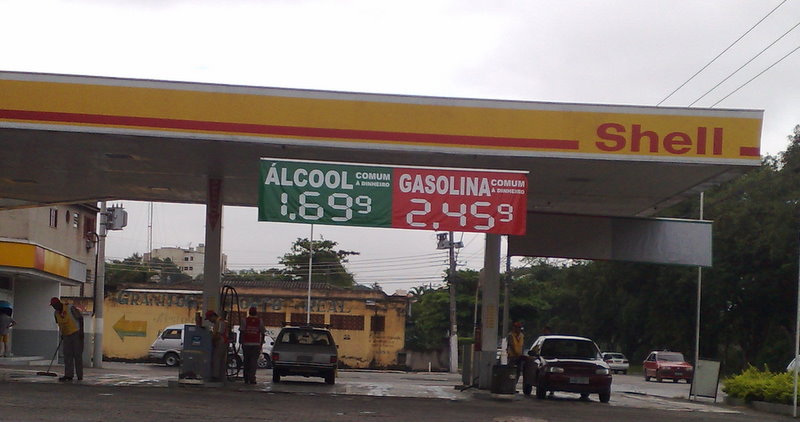 ver, they’re also paying the equivalent of about $5 per gallon. Alcohol is available at every filling station. Most newer cars are true flex-fuel cars and can run on gasoline, alcohol or any combination. Alcohol is always about 70% of the price of gasoline. This should be no surprise, because if you put a gallon of ethanol in your flex-fuel car, you will go about 70% as far as you will on gasoline. There’s less BTUs per gallon – no way around it. Of course, nobody has mentioned that little fact in the US, where we are converting our food supply to ethanol fuel as fast as we can. One way around the fuel costs is to convert your automobile to run on compressed natural gas. You can get that done for about R$1200 at two or three places in town. They bolt a tank into your trunk and run a line to the engine, where they bolt a gizmo that allows your car to switch between CNG and gasoline. Many cars here run on CNG, even though filling up is somewhat inconvenient – there are only three CNG stations in the city. The government encourages swapping to CNG – registration fees are less
ver, they’re also paying the equivalent of about $5 per gallon. Alcohol is available at every filling station. Most newer cars are true flex-fuel cars and can run on gasoline, alcohol or any combination. Alcohol is always about 70% of the price of gasoline. This should be no surprise, because if you put a gallon of ethanol in your flex-fuel car, you will go about 70% as far as you will on gasoline. There’s less BTUs per gallon – no way around it. Of course, nobody has mentioned that little fact in the US, where we are converting our food supply to ethanol fuel as fast as we can. One way around the fuel costs is to convert your automobile to run on compressed natural gas. You can get that done for about R$1200 at two or three places in town. They bolt a tank into your trunk and run a line to the engine, where they bolt a gizmo that allows your car to switch between CNG and gasoline. Many cars here run on CNG, even though filling up is somewhat inconvenient – there are only three CNG stations in the city. The government encourages swapping to CNG – registration fees are less
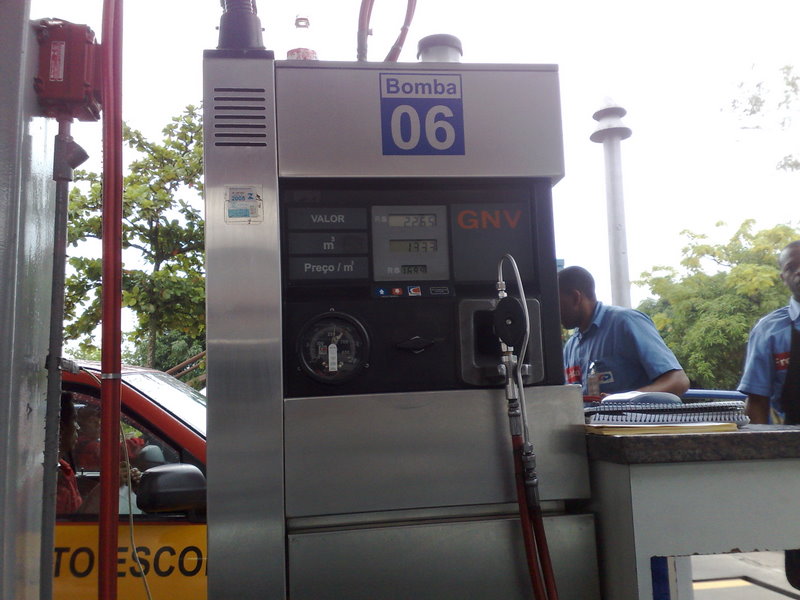
for CNG-converted vehicles. Our Tipo ran on CNG, but it was a little short of power. I drove it on CNG, but Monica drove it on gasoline, because the car was easier to drive. You can’t really read it, but the cost for 1cu. meter of natural gas is R$1.69. At the time, it was available for less than R$1.49 in Rio – that’s the problem with only having a few filling stations here. Even so, the cost per mile on CNG is about half that of gasoline. I think the government encourages it because it allows them to export more ethanol. If they can do this in Brasil, then for gosh sakes, why don’t we run our cars on CNG in the US???? Is it the farm lobby or the oil companies? It’s just common sense, folks.
We’re leaving for Juis de Fora for a few days to visit some friends. The trip was unexpected, but I’m sure that we’ll have a good time. I may not post while I’m gone, but I’m sure that I’ll have all sorts of neat stuff to write about when I get back. It’s late afternoon and the sky is getting dark. Monica’s not back from the beauty shop yet – if the sky gets any darker, I’ll drive into town to get her. It would be a really crappy walk in the rain.
Gotta go,
Greg
Leave a Reply